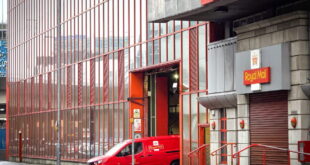News
CWU union leaders pulled an earlier ballot over the bad deal, fearing workers would reject it
Saturday 17 June 2023
Issue 2860
A mass rally in London last year during the Royal Mail strikes (Picture: Guy Smallman)
Postal workers will—at last—start voting on the rotten deal cooked up between profit-hungry Royal Mail bosses and CWU union leaders.
The CWU says a ballot will start on Thursday, 22 June, and close on 11 July. Management and union leaders are desperately hoping they can now force through an agreement that many workers said they would refuse to accept.
The depth of the anger saw the CWU withdraw an earlier ballot. The union now says that it has won further concessions and crucially “Our reps are back at the negotiating table”.
And there will be an additional lump sum payment of £900 which will be paid “upon ratification of the agreement”. It’s a one-off, not absorbed into the basis for future pay changes, and it will be subject to tax and national insurance that will reduce it sharply.
The money for the £900 payment is coming from cash linked to pensions. The official announcement says, “The trustee of the Royal Mail Pension Plan has agreed to release to Royal Mail some money that has been held separate to the Pension Plan.” It was there to shore up the pension scheme if it was in trouble. That money won’t now be there if there are future “emergencies”.
The extra cash is a result of the fear of rank and file revolt against the deal, not clever negotiation. Think what more defiance can achieve.
It’s easy to imagine what happened. Knowing workers were likely to chuck out the offer, the CWU went back to Royal Mail and said something like, “We’re going to need a bigger bribe.”
That won’t be enough for many workers. A Cardiff CWU member contacted Socialist Worker to say, “The job has become impossible with all the new changes they have introduced. If they think I’m going to throw away my future for a one-off lump sum then they’re wrong. And I am not happy about what’s happened to the victimised people.”
A Glasgow postal worker said, “It was a bad offer before the new announcement and it still is crap. I want it out.”
Remember what the bosses think of the deal. In April the Financial Times newspaper announced, “Shares in Royal Mail owner International Distributions Services rose 6 percent after the postal service group reached an agreement with the CWU.”
That’s not how they react to a defeat. Royal Mail management think they have already secured sufficient changes to workloads and staffing—”revisions”—in many parts of Britain. Only renewing the fight on a new and much more serious basis can stop their rampage towards a gig economy employer like Uber or Amazon.
There’s deep bitterness against the deal among Royal Mail workers, but it’s not widely organised. Now everyone who wants it chucked out has to mobilise for a rejection vote.
Postal workers should be proud of the battle they have fought against vicious bosses. They can win more.
Vote no. And then demand the union organises a properly democratic union conference—reflecting the mood from below—immediately to discuss the next steps and to escalate the strikes.
What’s wrong with the deal?
1. It means a pay cut over three years once price rises are taken into account.
It accepts there’ll be no improvement on the 2 percent that was forced on workers last year—and which they voted to strike against.
There would then also be a 6 percent increase from April this year, and a lump-sum bribe of £1,400 that doesn’t get added to workers’ pay packets after this year. Then workers will have to accept a measly 2 percent again next year.
Royal Mail has also agreed to a “profit sharing scheme,” where the first 20 percent of profits is shared out among workers as an annual bonus. But that all depends on whether the company is making profits and whether it declares them. It has numerous accounting tricks to hide the truth.
2. Bosses have suspended or sacked hundreds of reps and workers since the dispute began last year. Their reinstatement is hugely important to every union activist, and every worker who looks to the union for support.
The sackings were a deliberate attempt to break the union, and there should be no agreement until every one of them is back at work.
Instead, the agreement leaves their fate to a “review” by right wing Labour lord—and personal friend of Tony Blair—Lord Falconer. Falconer advised the coal bosses against the NUM union during the 1984-5 strike.
3. The agreement promises “no compulsory redundancies” but only until April 2025. After that, there will be a “review”—where bosses will no doubt demand more job cuts.
4. The agreement lets bosses push on with plans to deliver larger parcels from dedicated “parcels hubs”. This takes work—and so jobs—away from delivery offices.
These parcel deliveries will be mostly in the afternoons—later than many workers want to work. The company and union officials are supposed to encourage workers from delivery offices to “follow the work” and take jobs in the parcels hubs. But if they can’t, or don’t want to, bosses can use “alternative resourcing models”—agencies.
Management started recruiting new workers on worse terms and conditions in December last year. This essentially creates a two-tier workforce. That incentivises bosses to get rid of existing workers and replace them with newer ones.
The agreement accepts this. And while it says existing workers will not have to work Sundays if they don’t want to—and will keep Sunday bonus payments—new staff will have to work Sundays regularly.
Join the Workers Summit on 23 September
A “Workers’ Summit” is meeting around the slogan, “Link the fights, reject bad deals, fight to win,” on Saturday 23 September in London.
It’s described as “an afternoon for grassroots collaboration” and was initiated by Lambeth and Hackney NEU, NHS Workers Say No, and Strike Map. It’s not just for those involved in battles taking place now, but for every worker. The summit will host discussion but can also strengthen the networks of resistance at the base of the unions.
Source link



